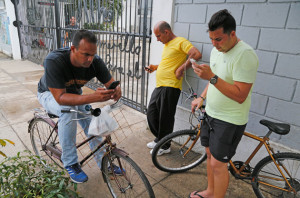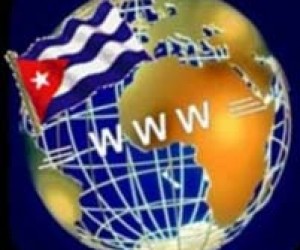CUBAN PEOPLE WITH A NEGATIVE INDEX IN THE INTERNET SERVICES.
The Ideological Department of the Communist Party is responsible for implementing the information policy of the regime. The department maintains strict control over the official media information provided to the population. There are many issues that are taboo. Journalists can not criticize the government. Everything about the behavior of the national economy is shrouded in secrecy. Nor can refer to violations of human rights or the repression of pro-democracy activists.
It is delusional to expect that the current regime is freedom of information and expression. All the undemocratic actions of the dictatorship rests on the Constitution of the Republic. Article 53 specifically warns: “Citizens have freedom of speech and press in accordance with the objectives of socialist society.”
The actions of the repressive forces against opponents is covered in Article 62: “None of the freedoms recognized for citizens can be exercised contrary to the provisions of the Constitution or against the existence and objectives of the socialist state, or against the decision to build socialism. The violation of this principle is punishable “.
That explains the government’s refusal to release the access of Cubans to the Internet, satellite TV, and deliberately slowed the development of fixed and mobile telephony. To allow the regime free internet access and satellite television, lose its control over the information that is offered to the people.
The official media are intended to give the false impression that the Government is working in the direction to release these information technologies. That is totally false. What he has done is insignificant, taking into account the enormous potential that exists in Cuba for ICT may have greater penetration.
In the article Onaisys Fonticoba, published last May 14 in the newspaper Granma, journalist paints a picture as if Cuba had entered the digital age and information society.
The Cuban population at the end of 2014, occupied one of the first places of computer illiteracy in the Western Hemisphere. However, Granma journalist says that “Cuba has three million users with access to networks, as email and internet is included.”
Such data belie folly that gives the National Bureau of Statistics and Information (ONEI) in its Economic and Social Panorama report of Cuba, April 2015 edition, in the chapter on “Information Technology and Communications. Selected Indicators” .
According to the report, the country 688 telephone exchanges, 616 of them digitized work. At the end of 2014, total fixed telephone lines was 1,288,463; of them were digitized 1,271,359, 99.6% of the total. Of that total of digitized lines 967 973 for the residential sector.
Argues the Telecommunications Company of Cuba (ETECSA) which is prevented from providing internet connection to the people who can afford this service, due to limited financial resources and technological problems, mainly because of the embargo imposed by Washington.
Such justification is totally false. The negative response to matters of a political, not technological problems.
According to that expressed in the report, they were registered in the country 1.0144 million computers. Of that total, they were connected to the Internet 515,400. Alternatively, 2,923 manner. 000 users connect to the network. But most internet was not really that connected, but the Cuban internal network called intranet.
Concerning internet, the government has extreme restrictions and control. Internet access is only authorized to universities, scientific institutions, national administrations of the mass organizations, national leaders and provincial Communist Party, a select group of pro-government journalists, more docile members of the Union of Writers and Artists (UNEAC) a handful of organic intellectuals and business leaders that have an important weight in the national economy. The number of authorized, as a whole, is negligible.
The government says the population has free access to internet and gives as an example of this 166 rooms navigation enabled by ETECSA, the 95 newly opened in the Youth Club of Computing and 89 who work in hotels and airports. However, official journalists who write on this subject do not say that in the halls of ETECSA and Computer Clubs have to pay $ 2.25 an hour (until December cost $ 4.50) and in hotels and airports fluctuates between 6 and 10 dollars an hour.
For most Cubans, who earn about 23 dollars a month, advances in communication that mark the XXI century, are unattainable.
This situation, however much they try to disguise it, it is an embarrassment for the government of Gen. Raul Castro.
DDC / Laffita Osmar Rojas, Havana / InternetPhotos / www.thecubanhistory.com
-Cuba Today/Today-
The Cuban History, HOLLYWOOD.
Arnoldo Varona, Editor.
POBLACIÓN CUBANA CON UN ÍNDICE NEGATIVO EN SERVICIOS DEL INTERNET.
El Departamento Ideológico del Partido Comunista es el responsable de aplicar la política informativa del régimen. Dicho departamento mantiene un estricto control sobre las informaciones que los medios oficiales brindan a la población. Hay muchos temas que son tabú. Los periodistas no pueden criticar al Gobierno. Todo lo relacionado con el comportamiento de la economía nacional está rodeado de secretismo. Tampoco pueden referirse a las violaciones de los derechos humanos ni a la represión contra los luchadores pro-democracia.
Es de ilusos esperar que con el actual régimen haya libertad de información y expresión. Todo el accionar antidemocrático de la dictadura descansa en la Constitución de la República. Específicamente en su artículo 53 advierte: “Se reconoce a los ciudadanos libertad de palabra y prensa conforme a los fines de la sociedad socialista”.
El proceder de los cuerpos represivos contra los opositores está amparado en el artículo 62: “Ninguna de la libertades reconocidas a los ciudadanos pueden ser ejercida contra los establecido en la Constitución ni contra la existencia y fines del Estado socialista, ni contra la decisión de construir el socialismo. La infracción de este principio es punible”.
Eso explica la negativa del Gobierno a liberar el acceso de los cubanos a internet, la TV satelital, y el deliberadamente ralentizado desarrollo de la telefonía fija y celular. De permitir el régimen el libre acceso a internet y la televisión satelital, perdería el control que ejerce sobre la información que se le brinda al pueblo.
Los medios oficiales pretenden dar la falsa imagen de que el Gobierno trabaja en la dirección de liberar estas tecnologías informativas. Eso es totalmente falso. Lo que ha hecho es insignificante, si se tiene en cuenta las enormes potencialidades que existen en Cuba para que las TIC puedan tener mayor penetración.
En el artículo de Onaisys Fonticoba, publicado el pasado 14 de mayo en el diario Granma, la periodista pinta un panorama como si Cuba hubiera entrado en la era digital y la sociedad de la información.
La población cubana, al finalizar el año 2014, ocupaba uno de los primeros lugares de analfabetismo informático del Hemisferio Occidental. No obstante, la periodista de Granma asegura que “Cuba cuenta con tres millones de usuarios con acceso a las redes, en lo que se incluye correo electrónico e internet”.
Tal desatino lo desmienten los datos que da la Oficina Nacional de Estadística e Información (ONEI) en su informe Panorama Económico y Social de Cuba, edición abril de 2015, en el capítulo referido a “Tecnología de la Información y las Comunicaciones. Indicadores seleccionados”.
Según dicho informe, en el país funcionan 688 centrales telefónicas, de ellas 616 digitalizadas. Al finalizar 2014, el total de líneas telefónicas fijas era de 1.288.463; de ellas estaban digitalizadas 1.271.359, el 99,6% del total. De ese total de líneas digitalizadas, corresponden al sector residencial 967.973.
Argumenta la Empresa de Telecomunicaciones de Cuba (ETECSA) que está impedida de brindar la conexión de internet a las personas que puedan pagar este servicio, debido a limitaciones de recursos financieros y a problemas tecnológicos, principalmente por culpa del embargo impuesto por Washington.
Esa justificación es totalmente falsa. La negativa responde a asuntos de naturaleza política, no a problemas tecnológicos.
De acuerdo a lo plasmado en el mencionado informe, estaban registradas en el país 1.014.400 computadoras. De ese total, estaban conectadas a Internet 515.400. De manera alternativa, 2.923. 000 usuarios se conectan a la red. Pero la mayoría no fue realmente a internet que se conectaron, sino a la red interna cubana conocida como intranet.
Respecto a internet, el Gobierno ha extremado las restricciones y el control. El acceso a internet solo está autorizado a universidades, instituciones científicas, direcciones nacionales de las organizaciones de masas, dirigentes nacionales y provinciales del Partido Comunista, un selecto grupo de periodistas oficialistas, los más dóciles integrantes de la Unión de Escritores y Artistas (UNEAC), un puñado de intelectuales orgánicos y dirigentes de empresas que tienen un importante peso en la economía nacional. La cifra de autorizados, en su conjunto, es insignificante.
El Gobierno dice que la población tiene acceso libre a internet y pone como muestra de ello las 166 salas de navegación habilitadas por ETECSA, las 95 recientemente abiertas en los Joven Club de Computación y las 89 que funcionan en hoteles y aeropuertos. Sin embargo, los periodistas oficiales que escriben sobre este tema no dicen que en las salas de ETECSA y los Joven Club de Computación hay que pagar 2,25 dólares la hora (hasta diciembre costaba 4,50 dólares) y que en los hoteles y aeropuertos fluctúa entre 6 y 10 dólares la hora.
Para la mayoría de los cubanos, que ganan alrededor de 23 dólares mensuales, los avances de la comunicación que marcan a las sociedades del siglo XXI, son algo inalcanzable.
Tal situación, por mucho que intenten disfrazarla, es una vergüenza para el Gobierno del general Raúl Castro.
DDC/Osmar Laffita Rojas, La Habana/InternetPhotos/www.thecubanhistory.com
-Cuba Hoy/Today-
The Cuban History, HOLLYWOOD.
Arnoldo Varona, Editor.



 CUBAN PEOPLE with a Negative Index in the Internet Services. *** POBLACIÓN CUBANA con un Índice Negativo en Servicios del Internet.
CUBAN PEOPLE with a Negative Index in the Internet Services. *** POBLACIÓN CUBANA con un Índice Negativo en Servicios del Internet.


